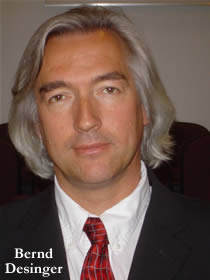 Bernd Desinger was born in 1962 in Oberhausen, Germany. He studied German language and literature, History, Psychology and Film. Bernd Desinger joined the Goethe-Institute in 1990. After postings in Germany and Athens, Greece, he became deputy director of the Goethe-Institute Toronto. In 2000 he was transferred to the Head Office in Germany, where he was in charge of film and media. In 2002 he became director of the Bonn branch of the Head Office, serving in a parallel capacity as head of the Department of Audiovisual Media. In this position he was responsible for the acquisition and co-production of documentary films. In addition, he produced an internationally distributed program series on German art and culture.
Bernd Desinger was born in 1962 in Oberhausen, Germany. He studied German language and literature, History, Psychology and Film. Bernd Desinger joined the Goethe-Institute in 1990. After postings in Germany and Athens, Greece, he became deputy director of the Goethe-Institute Toronto. In 2000 he was transferred to the Head Office in Germany, where he was in charge of film and media. In 2002 he became director of the Bonn branch of the Head Office, serving in a parallel capacity as head of the Department of Audiovisual Media. In this position he was responsible for the acquisition and co-production of documentary films. In addition, he produced an internationally distributed program series on German art and culture.
In 2005 he took over his current position as director of the Goethe-Institut Los Angeles.
Bijan Tehrani: Please tell us about history and activities of The Goethe-Institut Los Angeles.
Bernd Desinger: The Goethe-Institut Los Angeles opened its doors in 1983 and has established itself as an important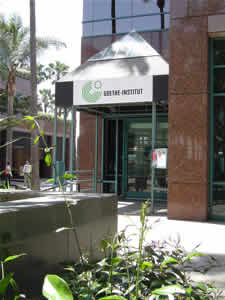 cultural player in various ways. It has obtained a higher visibility amongst the professional partners here in the city and it’s a facilitator of dialogue through the arts between the US and Germany. It’s a bridge building institution between the two continents. The Goethe-Institut in Los Angeles, especially, the sheer appearance when you enter its doors is dedicated to represent a current Germany, a lively Germany, a Germany that is dynamic, and interested in the exchange of cultures in order to foster its own cultural prosperity. Of course we also pay homage to the rich German cultural heritage and that for sure includes the heritage of the Jewish community that was so unfortunately
cultural player in various ways. It has obtained a higher visibility amongst the professional partners here in the city and it’s a facilitator of dialogue through the arts between the US and Germany. It’s a bridge building institution between the two continents. The Goethe-Institut in Los Angeles, especially, the sheer appearance when you enter its doors is dedicated to represent a current Germany, a lively Germany, a Germany that is dynamic, and interested in the exchange of cultures in order to foster its own cultural prosperity. Of course we also pay homage to the rich German cultural heritage and that for sure includes the heritage of the Jewish community that was so unfortunately 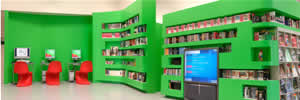 expelled and had to suffer severely during the dark years of the Nazi regime. The German immigrants and the German-Jewish immigrants from Germany to Los Angeles, this is, as everybody knows, a very interesting group and a very creative group that significantly influenced cinema in Hollywood and being in Los Angeles—in Hollywood—we focus on arts, design, and architecture, which are all prominent things here in the city, on media, and, first and foremost, on film. This is where we perfectly connect.
expelled and had to suffer severely during the dark years of the Nazi regime. The German immigrants and the German-Jewish immigrants from Germany to Los Angeles, this is, as everybody knows, a very interesting group and a very creative group that significantly influenced cinema in Hollywood and being in Los Angeles—in Hollywood—we focus on arts, design, and architecture, which are all prominent things here in the city, on media, and, first and foremost, on film. This is where we perfectly connect.
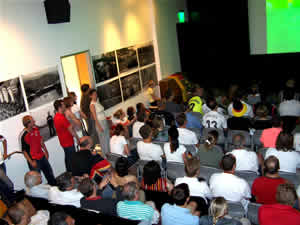 Bijan: How often do you have film screenings and how do you select films for those screenings?
Bijan: How often do you have film screenings and how do you select films for those screenings?
Bernd: We have actually various formats presenting German films. There is one successful series every year called Blockbuster Series where we feature about 10 new production feature-films but also documentaries from Germany, sometimes including productions from Austria and Switzerland as well. Then we do focus programs on various directors. These can be very established directors such as Wim Wenders and Werner Herzog. We just had a collaboration with the American Cinematheque on a Werner Herzog retrospective. It could also be emerging directors who are trying to find their way, who seem to be very interesting but are not yet known to Hollywood and so we open a window here. To answer your question about how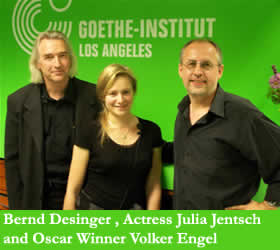 many screenings we have per year, we actually have quite a lot. I was just, the other week, checking into that for another report and we do at least 1 screening per week on average and sometimes more. This year we have a special focus on the fortieth anniversary of the sister-city ship between Berlin and Los Angeles and for this we have designed a program called “Starring Berlin”. In the program, there will be 40 Films from 110 years featuring Berlin as the star. Every Monday we have one of these films from the old
many screenings we have per year, we actually have quite a lot. I was just, the other week, checking into that for another report and we do at least 1 screening per week on average and sometimes more. This year we have a special focus on the fortieth anniversary of the sister-city ship between Berlin and Los Angeles and for this we have designed a program called “Starring Berlin”. In the program, there will be 40 Films from 110 years featuring Berlin as the star. Every Monday we have one of these films from the old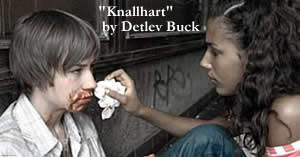 expressionist films to the current movies from Berlin. So there will be more than 40 films this year plus some more special programs. So you could say, on average, 60 to sometimes 80 films a year screened either here or in collaboration with our big partners in the city which are to the LACMA, the AFI, and so forth.
expressionist films to the current movies from Berlin. So there will be more than 40 films this year plus some more special programs. So you could say, on average, 60 to sometimes 80 films a year screened either here or in collaboration with our big partners in the city which are to the LACMA, the AFI, and so forth.
Bijan: Are German filmmakers coming here for any of the events?
Bernd: Absolutely. For the beginning of festivals, for instance, for the opening film we invite members of the production. We invite actors, etc. If we do the special programs, such as the one I mentioned before and one featuring young German filmmakers called “Beyond the Mainstream”, and of course we invite the director and the lead actors. If we do a feature on a director, on whatever creative person involved in the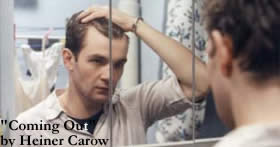 production, if we do a retrospective, we invite the person. In addition, we have a very successful program called Hollywood Talk Shop where we feature German creative people who made it big in Hollywood. Be it directors, be it cinematographers, or actors, we have an amazingly large number of successful people living here today. Of course there are names like Werner Herzog, like Wolfgang Petersen, like Roland Emmerich. But there are also groups of actors, sound engineers, of composers; very successful people and we do features here which means we show a clip reel of their work and then we have a discussion in front of the audience and provide a behind the scenes look that is very interesting as well for a general audience as for a professional audience and we have both here.
production, if we do a retrospective, we invite the person. In addition, we have a very successful program called Hollywood Talk Shop where we feature German creative people who made it big in Hollywood. Be it directors, be it cinematographers, or actors, we have an amazingly large number of successful people living here today. Of course there are names like Werner Herzog, like Wolfgang Petersen, like Roland Emmerich. But there are also groups of actors, sound engineers, of composers; very successful people and we do features here which means we show a clip reel of their work and then we have a discussion in front of the audience and provide a behind the scenes look that is very interesting as well for a general audience as for a professional audience and we have both here.
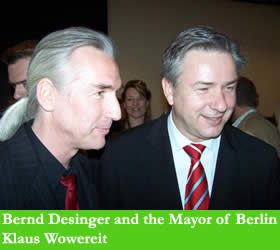 Bijan: Is Goethe Institut Los Angeles also involved in introducing cinema from other countries?
Bijan: Is Goethe Institut Los Angeles also involved in introducing cinema from other countries?
Bernd: Yes, we do so in a way of participation in various programs. Germany’s connections and relations through southeastern Europe are centuries long and there is a deep mutual appreciation and we, I myself and my colleague Margit Kleinman, are very dedicated to the current production, especially after the recent dark history we have had in this area. Basically, films do a lot to try to heal the wounds caused by this incredible and incomprehensible war and it has been great experience bringing together filmmakers and people from various ethnic groups to Goethe Institutes in general—not just in Los Angeles but also at and through our head office in Munich— and we have done a lot to foster this collaboration. Secondly, this year, we are engaged in a European film showcase together with the American Cinematheque. Thirdly, for the second time in a row we will be having a short Swiss Film Fest and we also collaborate closely with the Austrians. I would say that everyone with a great idea, with a good project, is welcome. We are so fortunate that, headed by our home office in Munich, we can make use of a network of 130 institutes worldwide. Needless to say, that this fact helps our international cultural endeavors tremendously.
Bijan: Please tell us a little bit more about your involvement with the Southeast European film festival…
Bernd: I am delighted to say, that the Goethe-Institut has become the “home” for the SEEFF. We hosted the opening night, as the films originated in the two new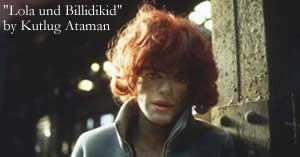 EU member states, Romania and Bulgaria. As far as programming is concerned, they did an excellent job with their selection of films. I was also impressed by the number of sponsors, which signed on to the festival, a clear indicator for their visibility and growth. And last, but not least, the audiences were larger and much more diverse in every regards, than last year.
EU member states, Romania and Bulgaria. As far as programming is concerned, they did an excellent job with their selection of films. I was also impressed by the number of sponsors, which signed on to the festival, a clear indicator for their visibility and growth. And last, but not least, the audiences were larger and much more diverse in every regards, than last year.
Bijan: What is your future plans regarding the field of cinema? Are there any new plans for the future?
Bernd: Well, some things can have old roots and still be new. For instance, we have a wonderful collaboration with the Academy of Motion Picture Arts and Sciences in presenting film exhibitions from Germany here in Los Angeles, and we are, in fact, the only institution that does so in the entire United States. For instance, last year we brought over “Production Design”, an exhibition focussing on set designs, created by the Film Museum in Berlin, and currently their latest successful exhibition “Cinema on the Mind” is prepared for presentation at the Academy. It’s about the intriguing relation of psychology and film, and will open June 15.
 This format is also thought as an exchange format, so we also want to bring Academy Exhibitions to Berlin. For future plans, since Germany is so rich as a film country, it’s difficult to present everything at the same time. So we decided to go by regions. In 2007, as mentioned, we have a focus on Berlin. For 2008, film production from Bavaria, which is very rich and very versatile, will be at the center of our film programming. Stay tuned!
This format is also thought as an exchange format, so we also want to bring Academy Exhibitions to Berlin. For future plans, since Germany is so rich as a film country, it’s difficult to present everything at the same time. So we decided to go by regions. In 2007, as mentioned, we have a focus on Berlin. For 2008, film production from Bavaria, which is very rich and very versatile, will be at the center of our film programming. Stay tuned!

